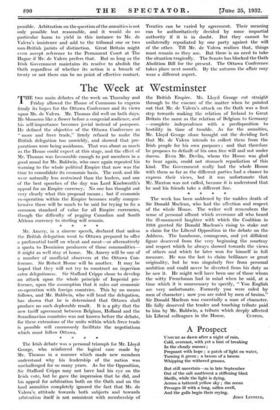The Week at Westminster
THE two main debates of the week on Thursday and Friday allowed the House of Commons to express firmly its hopes for the Ottawa Conference and its views upon Mr. de Valera. Mr. Thomas did well on both days. He blossoms like a flower before a congenial audience, and his self-importance becomes jovial instead of pompous. He defined the objective of the Ottawa Conference as "more and freer trade," firmly refused to make the British delegation too unwieldy, and showed that pre- parations were being assiduous. That was about as much as the House could expect at this stage, and the effect of Mr. Thomas was favourable enough to put members in a good mood for Mr. Baldwin, who once again repeated his warning to the whole political Empire that now was the time to consolidate its economic basis. The rank and file were naturally less restrained than the leaders, and one of the best speeches of the day was Lord Knebworth's appeal for an Empire currency. No one has thought out very clearly what this proposal means ; but if economic co-operation within the Empire becomes really compre- hensive there will be much to be said for trying to fix a common standard of value for all Empire currencies, though the difficulty of pegging Canadian and South African currency to sterling will remain.
* * * * Mr. Amery, in a sincere speech, declared that unless the British delegation went to Ottawa prepared to offer a preferential tariff on wheat and meat—or alternatively a quota to Dominion producers of those commodities— it might as well stay at home. Mr. Amery will be one of a number of unofficial observers at the Ottawa Con- ference. Sir Robert Horne will be another. It may be hoped that they will not try to construct an imperium extra delegationem. Sir Stafford Cripps chose to develop an attack upon the whole principle of Imperial pre- ference, upon the assumption that it rules out economic co-operation with foreign countries. This by no means follows, and Mr. Baldwin, who will head the delegation, has shown that he is determined that Ottawa shall produce no such deplorable result. It is a pity that the new tariff agreement between Belgium, Holland and the Scandinavian countries was not known before the debate, for these extensions of the units within which freer trade is possible will enormously facilitate the negotiations which must follow Ottawa.
* S * * The Irish debate was a personal triumph for Mr. Lloyd George, who reinforced the logical case made by Mr. Thomas in a manner which made new members understand why his leadership of the nation was unchallenged for so many years. As for the Opposition, Sir Stafford Cripps may not have had his eye on the Irish vote, but he gave the impression that he did, and his appeal for arbitration both on the Oath and on the land annuities completely ignored the fact that Mr. de Valera's, attitude towards both subjects and towards arbitration itself is not consistent with membership of the British Empire. Mr. Lloyd George cut straight through to the essence of the matter when he pointed out that Mr. de Valera's attack on the Oath was a first step towards making the relation of Ireland to Great Britain the same as the relation of Belgium to Germany —complete independence with a predisposition to hostility in time of trouble. As for the annuities, Mr. Lloyd George alone brought out the deciding fact that Mr. de Valera intends to collect them from the Irish people for his own purposes ; and that therefore he proposes to default of his own free will and not under duress. Even Mr. Devlin, whom the House was glad to hear again, could not stomach repudiation of this kind. The Government really had the whole House with them so far as the different parties had a chance to express their views, but it was unfortunate that Mr. Maxton was not called, because it is understood that he and his friends take a different line.
* * * *
The week has been saddened by the sudden death of Sir Donald Maclean, who had the affection and respect of the whole House. The writer well remembers the sense of personal affront which overcame all who heard the ill-mannered laughter with which the Coalition in 1918 greeted Sir Donald Maclean's rising to stake out a claim for the Liberal Opposition in the debate on the Address. The handsome, courageous, and yet diffident• figure deserved from the very beginning the courtesy and respect which he always showed towards the views of others and which he later won for himself in full measure. He was the last to claim brilliance or great originality, but he was singularly free from personal ambition and could never be diverted from his duty as he saw it. He might well have been one of those whom. the witty Frenchman had in mind when he said, at a time which it is unnecessary to 'specify, "You English are very unfortunate. Formerly you were ruled by men of character ; now you are ruled by men of brains." Sir Donald Maclean was essentially a man of character. He fully deserved the tender and touching tribute paid to him by Mr. Baldwin, a tribute which deeply affected his Liberal colleagues in the House, CUSTOS. •


































 Previous page
Previous page